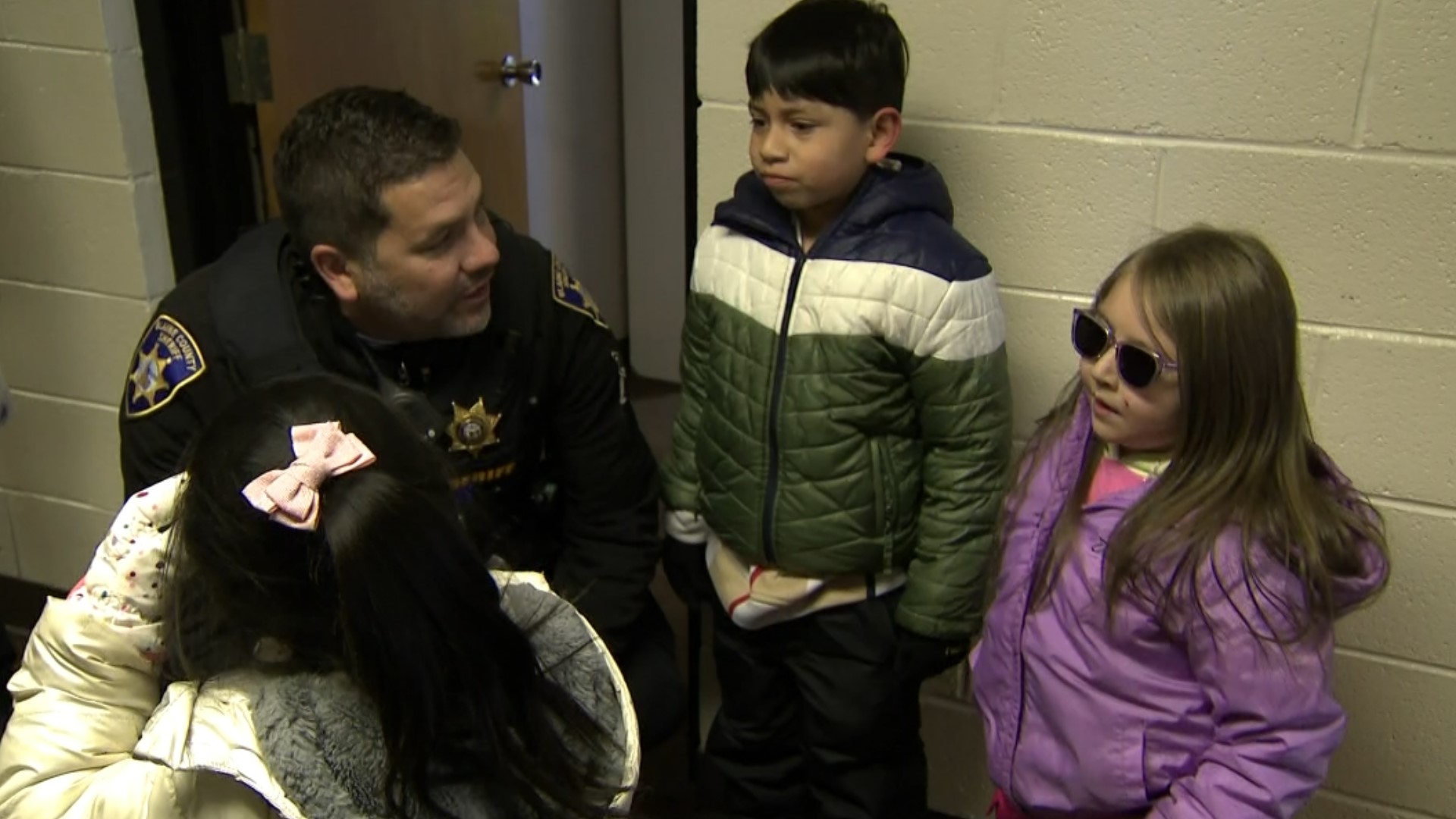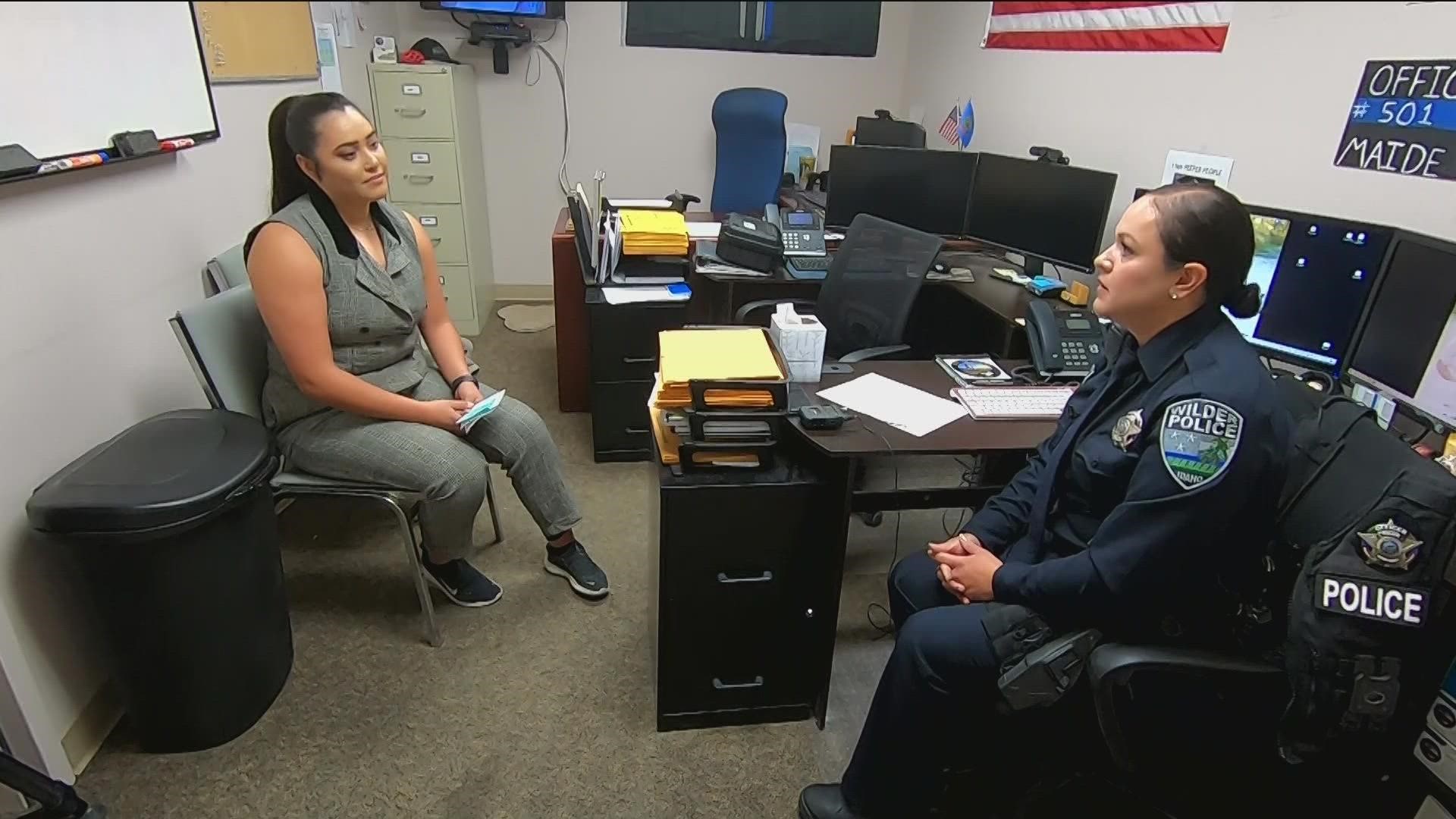'We needed to have this connection': Building trust between Latinos and law enforcement in Idaho
Studies show Latinos trust law enforcement less than non-Latinos. So, KTVB set out to learn how officers are trying to build relationships with Hispanic communities.

For many years, Latinos and Hispanics say they have felt a lack of safety and trust when it comes to Idaho's police departments.
Some of the feelings stem from how and where they group up, in countries where police are corrupt.
Margie Gonzalez, the executive director of the Idaho Commission for Hispanic Affairs (ICHA), calls it an ongoing issue.
"That negative experience has been passed down from generation to generation," Gonzalez said. "When you have someone in your family either be tortured or murdered, tell me how you get past that? How do you get past that and start to trust?"
Some of the distrust also stems from their own interactions and experiences with law enforcement in the United States. The distrust creates a divide in the communities, but also a threat to overall public safety.
A study by ICHA shows 78% of non-Hispanics say they would report a crime if they witnessed one, but only 57% of Hispanics feel the same way.
Gonzalez said the big issue is trust, but another main reason for not reporting is the language barrier.
"Some of these police departments are pulling people over, the patrol officers, and some of them were telling me, 'well we have them waiting there for 20 to 30 minutes before we can get anyone that speaks their language,'" Gonzalez said.
According to Gonzalez, the wait times is primarily due to the lack of representation in Idaho's police departments.
Wilder Police Department Is It Enough?
Some departments, including the Wilder Police Department, are on a mission to hire more Spanish-speaking officers.
"It's almost a daily basis that we have a need for it and being able to communicate and give the resources necessary to that population," Wilder Police Chief Dusty Tveidt said.
The 2020 US Census shows Hispanics make up 66% of Wilder's population. Tveidt said the number grows to 75% with seasonal workers during harvest season.
Even though more than half of Wilder's population is Hispanic, the police department only has one Spanish-speaking Latina out of six officers on staff; officer Maide Blanco.
"That's my background. I was born to a Mexican immigrant family who came here in search of work," Blanco said. "So, I grew up on this street. It's very special to me and I don't see a scenario in which I would leave, because I do hold this community very near and dear to my heart. This was the goal originally when I considered going into law enforcement, the goal was to work for this police department."
Blanco said being in the department gives her a chance to show a different perspective, and to help Wilder Police understand the community they serve.
"I do offer that perspective to my fellow officers in telling them, 'yes, it is tough. You're in search of this dream and giving your kids a better life and it's hard to not be able to communicate well.' Those instances where we have domestic violence victims that can't speak English, for me it's extremely important to offer someone that they can resonate with," Blanco said. "They say, 'ok, this person understands me, not only as a person that speaks Spanish or my language, but this person is female and this person looks like me.' There's just that level of trust, that level of trust goes up. It just does, because we're more likely to open up to someone that we feel relates to us, right?"
Wilder resident and business owner Jose Gallegos said he is grateful to have officer Blanco out in the community.
"Ahorita estamos contentos es algo que ayudara a la comunidad latina también."
Translation: "Right now we are happy, it's something that helps the Latino community as well," Gallegos said.
Gallegos said he hopes to see more representation in the future than just one police officer, however.
"Ha estado creciendo el pueblo so hay muchas personas que no hablan inglés eso ayudaría bastante para la comunidad y la policía."
Translation: "The town has been growing so there are a lot of people who don't speak English, adding more would help the community and the police," Gallegos said.
Blanco said she is often requested by the Spanish-speaking community and she is honored to help, but Gonzalez said that could lead to burn out.
It's happened many, many times in our state," Gonzalez said. "You're going to burn out that person, regardless if you're paying them a differential pay, which I would hope that they are."
Gonzalez is encouraging more police departments to take action and learn about their communities.
"Can I walk a mile in their shoes? We can't discriminate against them because they are struggling to build that trust, because we don't know what they've been through," Gonzalez said.
On top of hiring Blanco to help serve the large population of Latinos and Hispanics in Wilder, they also offer Spanish courses for new officers when they onboard, but it is now a requirement.
Blaine County Sheriff's Office Hispanic Liaison Team
Wilder is not the only police department in Idaho making an effort with the Latino community.
The Blaine County Sheriff's Office created the Hispanic Liaison Team two years ago to better serve and protect the growing Latino population.
Inside the sheriff's office's walls, bridges are built, relationships flourish and – hopefully – trust between law enforcement, and the community, grows. The work also extends to community events, on calls for service and in the jail.
KTVB spoke with Cristian Gonzalez, a deputy, and Fabrizio Lizano, the head of the Hispanic Liaison Team, about its impact on the community.
"We needed to have this connection with the Hispanic population that we have," Lizano said. "We wanted to create relationships with people to feel comfortable and feel like they're part of the community."
Lizano and Gonzalez make up the team. They want Hispanics to feel comfortable with them and comfortable reporting crimes.
"I wanted to be the change for our community," Gonzalez said. "One of my big goals is to prevent police brutality in front of me."
Lizano said being apart of the team is "very fulfilling that someone like me, an immigrant that came 25 years ago, can have this job and help a community."
Latinos account for a growing percentage of the population in Blaine County. The 2020 Census shows they make up at least 24% of the population.
Community leaders believe that number is actually around 30%. However, only three out of 33 deputies with the Blaine County Sheriff's Office -- about 9% of the deputies -- speak Spanish.
KTVB asked Gonzalez why it is important to have Latino representation and Spanish-speaking leaders in law enforcement.
Gonzalez responded, "you get the trust."
Weekly – even on their days off – Gonzalez and Lizano field calls from other officers, asking for help translating.
"They're having problems communicating even in a simple setting like traffic stop," Gonzalez said. "Sometimes it's a little overwhelming. I've been a lot of calls and I'm actually in background and they go straight and start talking to me."
Research shows Latinos have less confidence in law enforcement than non-Latinos. An Idaho State Police report shows Latinos may be less likely to report violence for cultural reasons, such as family dynamics and authority, language barriers and immigration status.
When responding to calls with Latinos, Lizano and Gonzalez say officers sensed hesitation, distrust and fear.
"I think the way we grew up. We've – at least for me – I can say I didn't grow up asking for help, just grew up doing by myself," Gonzalez said.
However, they now sense some of those feelings fading, with the creation of the Hispanic Liaison Team.
"We did notice that before that maybe a lot of crimes went unreported because they have fear to talk to police," Lizano said. "Maybe thought they were gonna get deported depending on legal status. A lot of times police is the problem for a lot of these countries they are coming from."
Herbert Romero has spent decades advocating for the Latino community and police reform in the US.
"There has been a gap on where we could have done a better job to really build trust and bridge and even address the issues," Romero said. "Now for me it's not about building bridges no more. It's about taking care of that bridge."
To take care of that bridge, Romero's Hispanic Leadership Organization in Blaine County works closely with the sheriff's Hispanic Liaison Team.
"Actions speak louder than words. So, I see them in action at events," Romero said. "The response from people who are open is very positive and we are in the right direction."
Other leaders uplift the progress, too.
County Commissioner Dick Fosbury feels this effort helps make their diverse community safer.
"Community outreach is really important particularly when dealing with public safety and law enforcement," Fosbury said. "They need to feel comfortable that law enforcement is there to protect all of us, but it's a constant struggle as we've seen across the US."
Lizano said he is the only Spanish-speaking officer in the department's patrol division, and "100%" wishes there was more.
"There's still a lot of work to be done no matter what," Fosbury said.
Although they offer incentive pay for bilingual deputies, the Blaine County Sheriff's Office is struggling to hire Hispanic officers, and just officers in general.
"We're a little limited because of running from call to call," Lizano said. "It's definitely hard and that's why I recruit everybody."
They want to hire Latinos who already live in the community.
"Maybe they don't feel like they're part of the community and I think that's maybe one of the issues," Lizano said.
In the meantime, Lizano and Gonzalez work extra hard to help everyone feel apart of the community.
"It's real, tangible, it's not just stats and systems, but they're literally meeting families where they're at," Romero said.
Watch more Local News:
See the latest news from around the Treasure Valley and the Gem State in our YouTube playlist:
Download the KTVB mobile app to get breaking news, weather and important stories at your fingertips.


